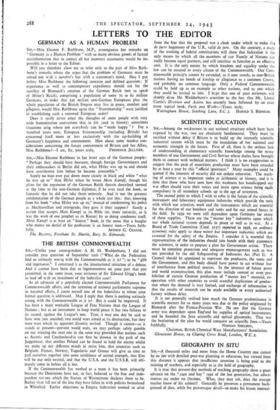THE BRITISH COMMONWEALTH
SIR,—Unlike your correspondent A. H. M. Wedderburn, I did not consider your question of September 'loth (" What do the Federalists find so seriously wrong with the Commonwealth as it is? ") to be " glib and ingenuous." I construed it as the international initiation of a debate. And it cannot have been due to ingenuousness on your part that you permitted, in the same issue, your reviewer of Sir Edward Grigg's book to lead off w:th an instalment of the federalist case!
As an advocate of a popularly elected Commonwealth Parliament for Commonwealth affairs, and the retention of national parliaments supreme in national affairs, I count myself one of the federalists to whom your formal question is addressed. May I reply that there is nothing seriously wrong with the Commonwealth as it is? But it could be improved. It has been a more workable League of Free Nations than the League of Nations ; but as an instrument to keep world peace it has two failures to its record, against the League's one. True, it may one day be said to have won (not unaided) two world wars aimed at its destruction, but they were wars which its apparent disunity invited. Though it cannot—as it stands at present—prevent world wars, we may perhaps safely gamble on our winning the next one in the same way provided that nations such as Austria and Czechoslovakia can first be thrown in the path of the Juggernaut, that another Poland can be found to hold the enemy whilst we make up our different minds to resist him, that countries such as Belgium, France, Norway, Yugoslavia and Greece will give us time to pull ourselves together into some semblance of united strength, that Eire will be our only neutral, and that the U.S.A. and the U.S.S.R. will ulti- mately come in before all is lost.
If the Commonwealth has worked as a team it has been primarily because the Dominions have not, in fact, behaved as the free and inde- pendent nations Which the Statute of Westminster declares them to be. Rather than fall out of the line they have fallen in with policies formulated in Whitehall. Earlier objections to Empire federation seemed to arise from the fear that the proposal was a cloak under which to make this de facto hegemony of the U.K. valid de jure. On the contrary, a study of the working of federal constitutions will show that federation is the only means by which all the members of our Family of Nations can really become equal partners, and still continue to function as an effective unit. It is the only means by which freedom and equality under the law can be assured to every citizen of the Commonwealth. Our Com- monwealth principle cannot be extended, as it now stands, to non-British nations having no bonds of kinship or allegiance to a common Crown, and probably no common language. Only a Federal Commonwealth could be held up as an example to other nations, and as one which they could be invited to join. I hope that one of your reviewers will shortly draw Mr. Wedderburn's attention to the fact that Mr. Lionel Curtis's Decision and Action has recently been followed by an even more topical book, Faith and Works.—Yours truly,
Walsingham House, Seething Lane, E.C. 3. HAROLD S. BIDMEAD.


























 Previous page
Previous page